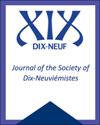Pessimism, Narrative, and Meaning in Henry Céard’s Une belle journée
IF 0.3
4区 社会学
0 HUMANITIES, MULTIDISCIPLINARY
引用次数: 0
Abstract
ABSTRACT Henry Céard's Une belle journée, a ‘plotless' novel, illuminates debates about pessimism in late nineteenth-century France by bringing to the fore the imperative to interpretation. The way that the novel's heroine is cast as having resigned herself to lackluster existence presents a contrast with Flaubert's Emma Bovary and ignites debates about whether resignation represents an abdication of happiness or creates its conditions of possibility. Readers' interpretation of Céard’s novel is bound up with their understanding of pessimism; debates about the novel can illuminate and be illuminated by larger debates about pessimism in fiction and non-fiction in the later nineteenth century.亨利·卡萨伊德《美丽的旅行》中的悲观主义、叙事与意义
亨利·卡萨伊德的《旅行的美丽》是一部“没有情节”的小说,通过将解释的必要性放在重要位置,阐明了19世纪晚期法国关于悲观主义的争论。小说中的女主角被塑造成屈从于平淡生活的形象,这与福楼拜笔下的艾玛·包法利形成了鲜明对比,引发了关于屈从是放弃幸福,还是创造了幸福的可能性的争论。读者对卡萨德小说的解读与他们对悲观主义的理解息息相关;关于小说的争论可以启发和启发十九世纪后期关于小说和非小说中的悲观主义的更大的争论。
本文章由计算机程序翻译,如有差异,请以英文原文为准。
求助全文
约1分钟内获得全文
求助全文

 求助内容:
求助内容: 应助结果提醒方式:
应助结果提醒方式:


